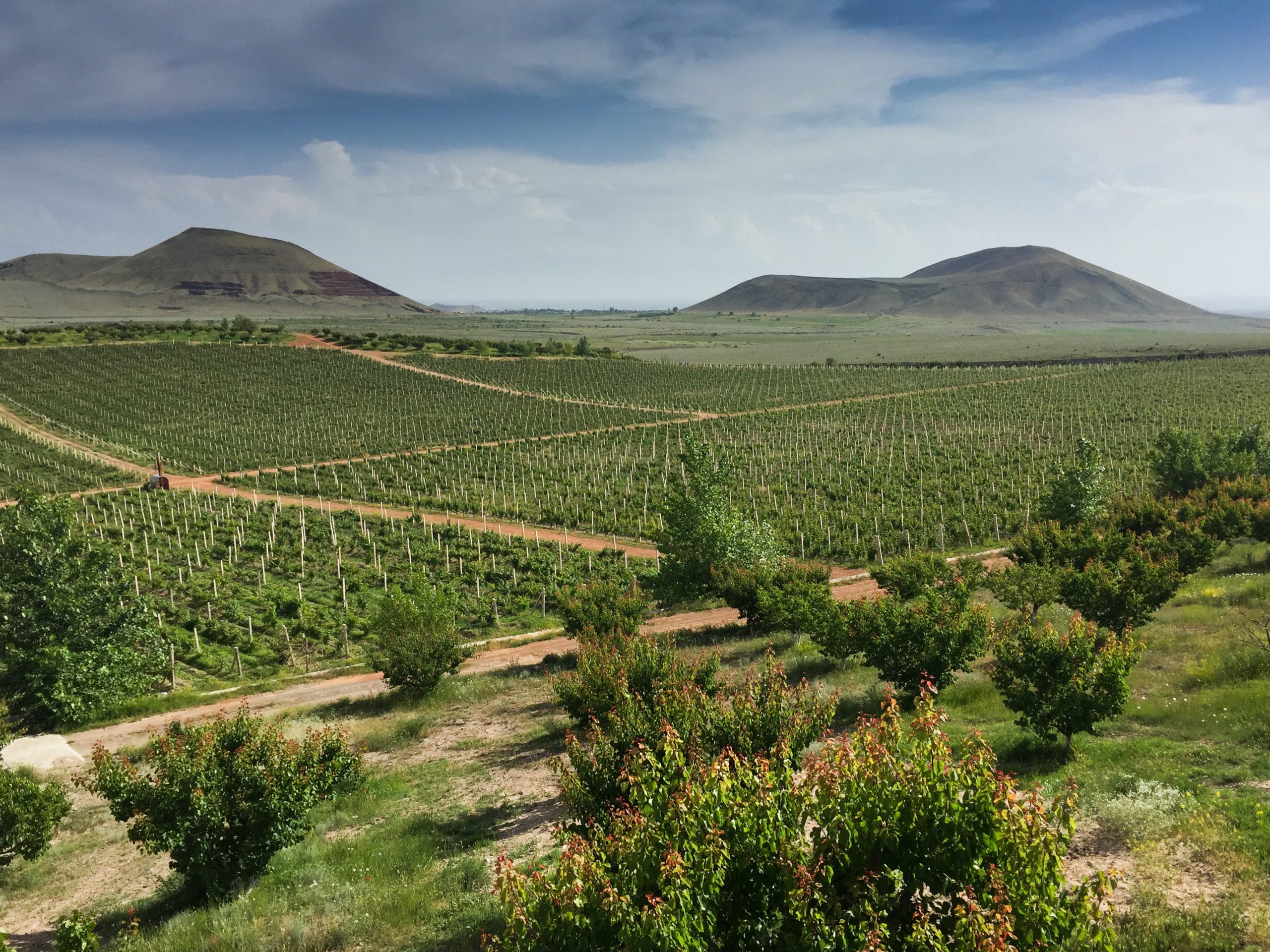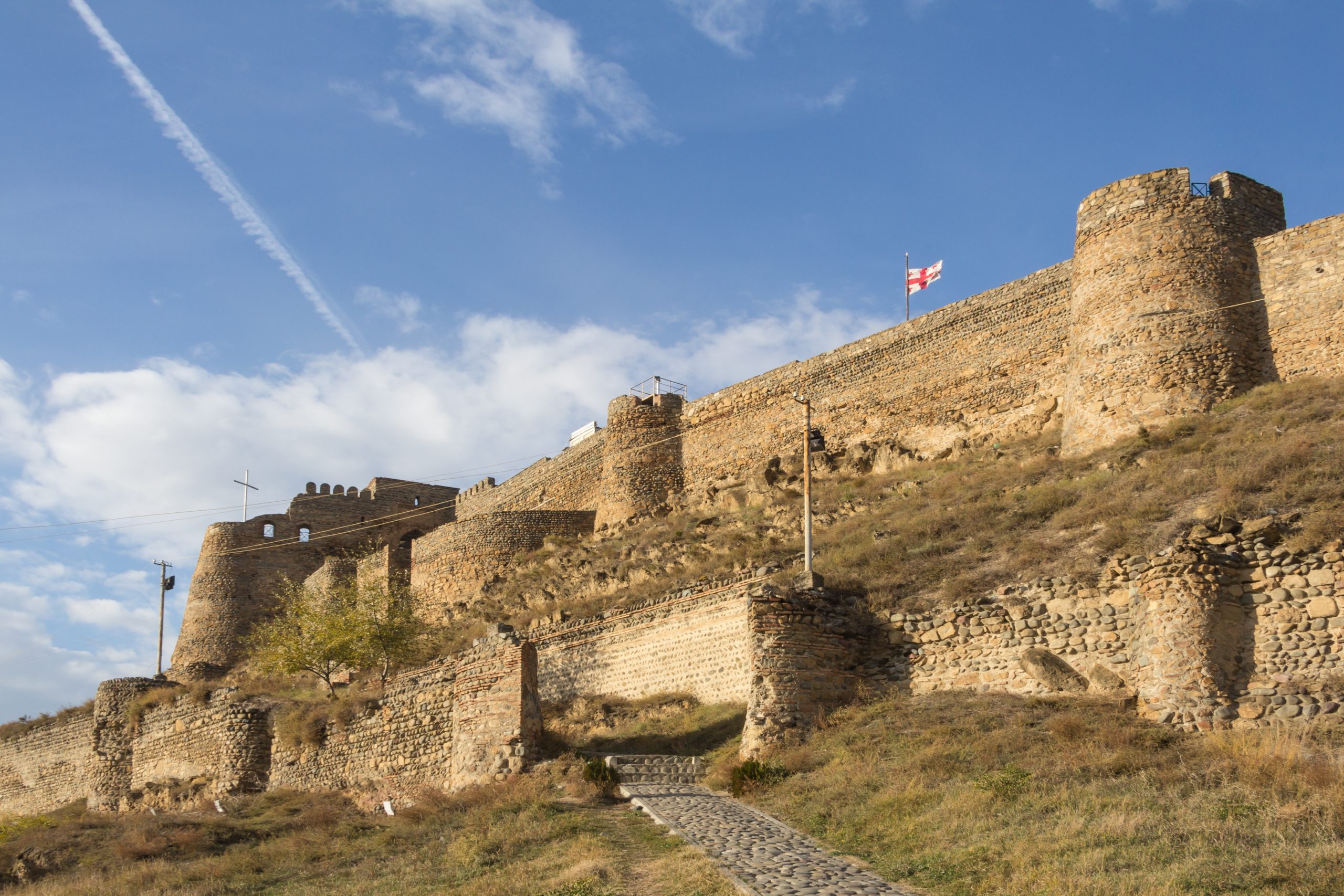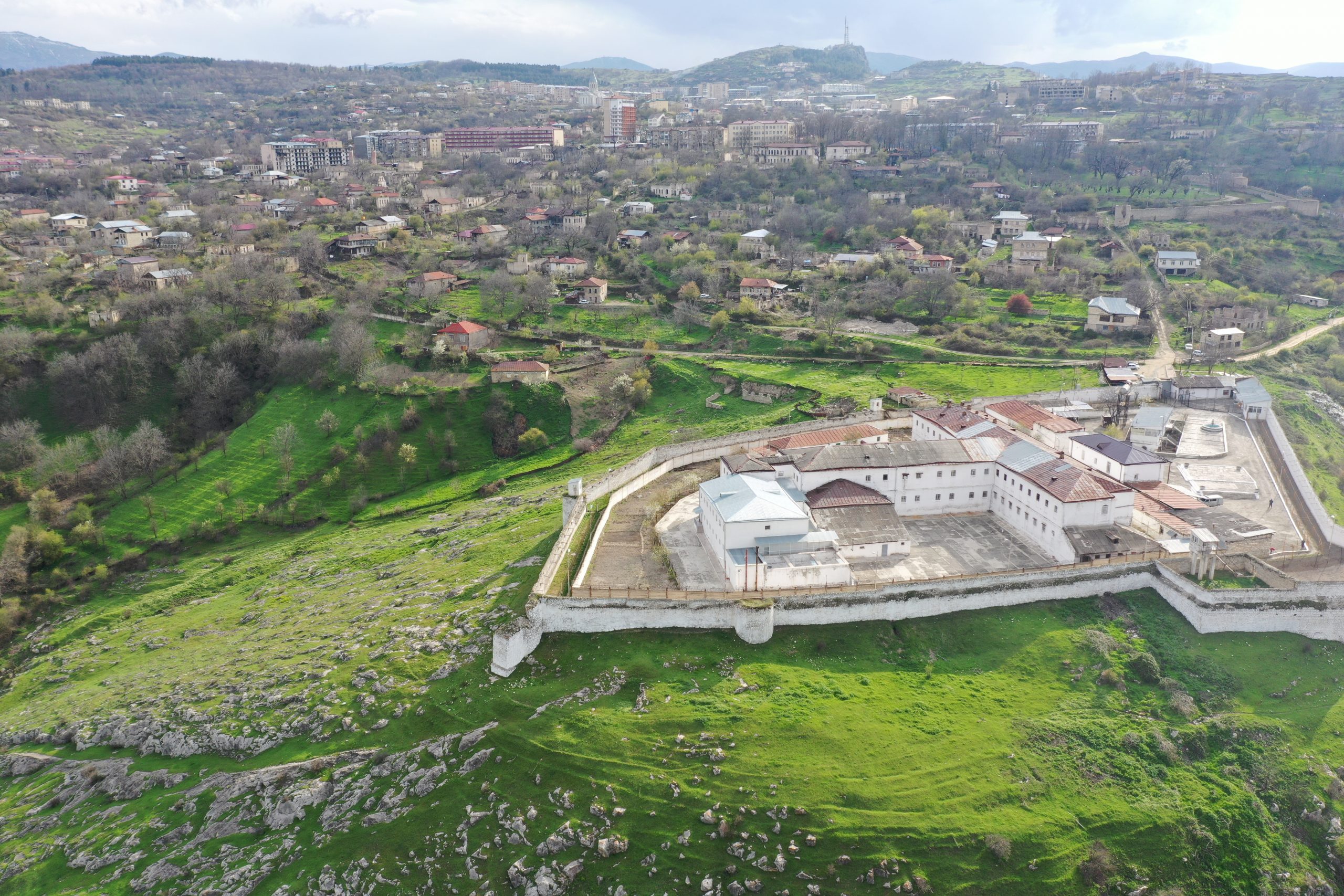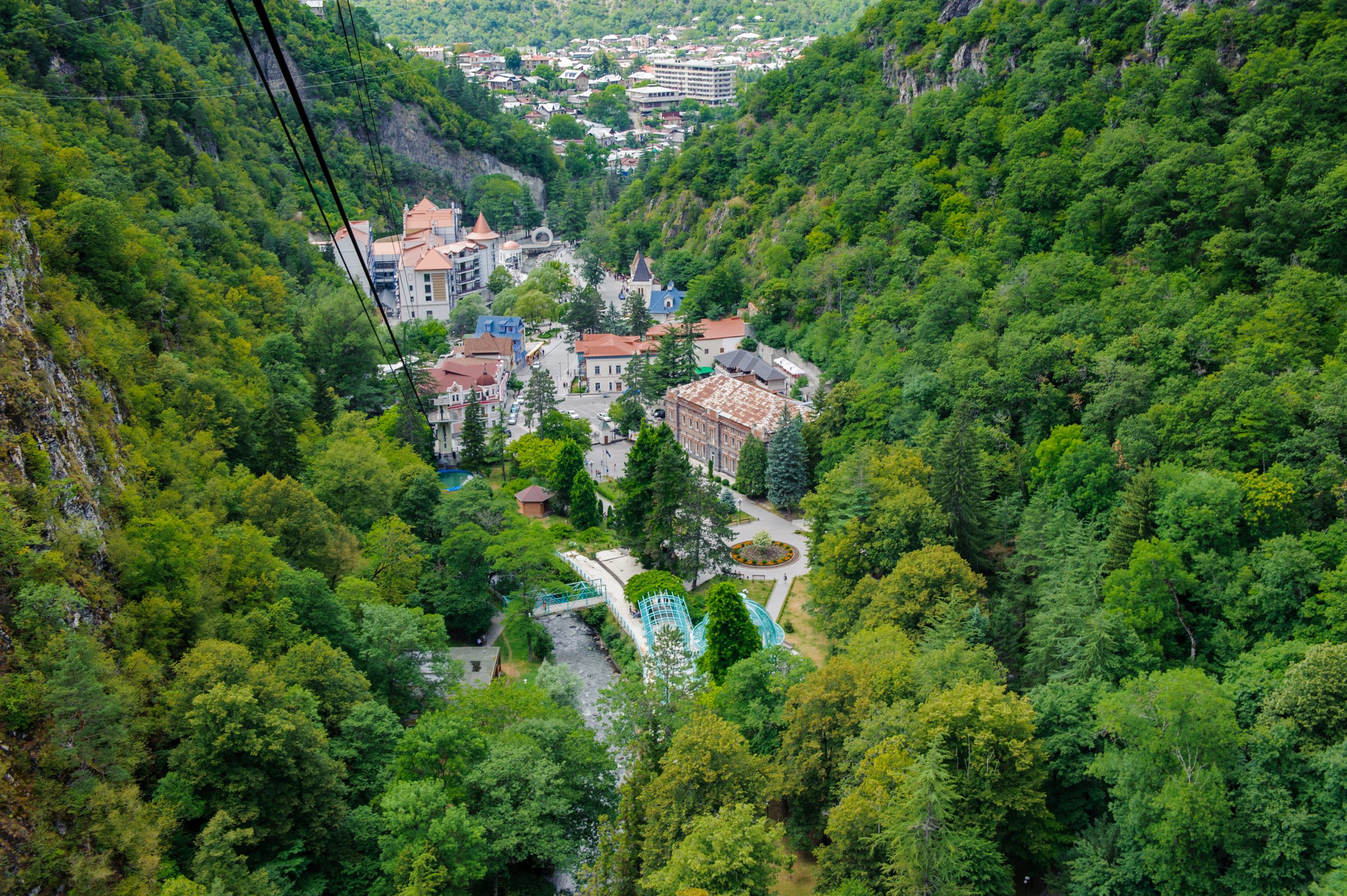Strategic Analysis Caucasus Brief
Bi-weekly review (08. 11. – 20. 11. 2022)
Tomáš Baranec
Armenia

Vineyards, Aragatsotn province, Armenia. Photo: Elena Diego/ Shutterstock.com
The Armenian opposition ended the boycott and returned to parliament
Two opposition factions returned to the National Assembly on November 14 after more than half a year of boycotting sessions of the Armenian parliament for what they said were political purposes, reports Radio Azatutyun.
The Hayastan and Pativ Unem factions affiliated with former presidents Robert Kocharian and Serzh Sarkisian, respectively, said they ended their boycott to further “the agenda of vital concern” to the people of Armenia and Nagorno-Karabakh.
“We are here, and you have to reckon with this fact,” said Aghvan Vardanian, a member of the Hayastan faction, at the beginning of a regular four-day session.
“This is the National Assembly of the Republic of Armenia and the National Assembly of the citizens who sent us here. It is not your property,” added Vardanian, addressing his words to the parliament majority represented by Prime Minister Nikol Pashinian’s Civil Contract party.
As Asbarez.am reminds, the two opposition factions began their political boycott of parliament sessions in April 2022 after Prime Minister Pashinyan’s statement about the purported expectation of the international community that Armenia should “lower the bar” in regard to the status of Nagorno-Karabakh in peace talks with Azerbaijan. They scaled back the protests six weeks later after failing to unseat the prime minister.
Pashinyan and his political allies dismissed the demands for his resignation, saying that the opposition had failed to attract widespread support for regime change.
Citing the chronic absenteeism of opposition lawmakers, the majority ousted several of them from leadership positions in parliament committees. At the same time, Hayastan’s Ishkhan Saghatelyan was dismissed from his post of deputy speaker.
The pro-government Civil Contract faction also threatened to strip all “chronically absent” lawmakers of their mandates but eventually did not act upon its threats. An opposition movement supported by the Hayastan and Pativ Unem blocs held its latest rally on November 5. It said the rally was a manifestation of support for the demand of Karabakh Armenians that the Armenian government must not unequivocally recognise Azerbaijan’s territorial integrity through a bilateral peace treaty.
The Pashinyan government dismisses accusations that it is negotiating any peace deal that will disregard the rights and freedoms of ethnic Armenians living in Nagorno-Karabakh.
Sources:
- Azatutyun.am, “Armenian Opposition Ends Boycott Of Parliament“, https://www.azatutyun.am/a/32131468.html
- Hetq.am, „Armenian Opposition MPs End Parliament Boycott“, https://hetq.am/en/article/150196
- Asbarez.am, “Opposition Factions End Parliament Boycott“, https://asbarez.com/opposition-factions-end-parliament-boycott/
French Senate condemns Azerbaijan’s September attack, calls for sanctions on Baku
The French Senate has adopted a resolution calling for sanctions to be imposed against Azerbaijan and for France to recognize de facto Nagorno-Karabakh, leading to fury in Baku, reports OC Media. The resolution was adopted on November 16 by 295 votes to one.
“We call on the government to consider…confiscation of the property of Azerbaijani leaders and the possibility of placing a ban on the import of Azerbaijani gas and oil,” the resolution was quoted by Radio Azatutyun as reading in part.
Notably, the resolution is non-binding, and the French government is not required to take further action in response to its passage. A representative from France’s Foreign Ministry present at the vote did not say if the government would respond to the resolution, noting only that “no country in the world does more to support Armenia.”
The resolution’s passage was quickly welcomed in both Yerevan and Stepanakert, with Armenian Parliament Speaker Alen Simonyan and de facto Karabakh State Minister Ruben Vardanyan each releasing statements hailing the resolution. In sharp contrast, Azerbaijan’s Foreign Ministry posted a lengthy rejection of the resolution, calling it “false and slanderous,” “biased and one-sided,” and an “open provocation (that) serves to undermine the process of normalisation of relations between Azerbaijan and Armenia.”
On the following day, the Azerbaijan Parliament adopted a statement condemning the French Senate. The statement called for assets belonging to French officials in Azerbaijan to be frozen and for cooperation with French energy companies to be reconsidered.
Speaker of Azerbaijani Parliament Sahiba Gafarova, who opened the debate, said that every line of the French resolution contained “hatred against Azerbaijan”. The head of the pro-government Vatan Party, Fazail Agamali, proposed to review the relations with France and to recall Azerbaijan’s ambassador to France, while MP Tahir Karimli, meanwhile, proposed declaring France an enemy state. During the sitting, Human Rights Committee Chair Zahid Oruj also appeared to threaten to cut off Azerbaijani gas supplies to Europe.
Just weeks after the end of the Karabakh war two years ago, the French Senate passed a resolution calling on the government to recognise Karabakh’s independence. That resolution, like Tuesday’s, passed nearly unanimously and was non-binding.
Sources:
- AGHAYEV Ismi, AVETISYAN Ani, „OC Media, French Senate calls for sanctions on Azerbaijan and recognition of Nagorno-Karabakh“, https://www.civilnet.am/en/news/682344/french-senate-condemns-azerbaijans-september-attack-calls-for-sanctions-on-baku/
- Civilnet.am, „French Senate condemns Azerbaijan’s September attack, calls for sanctions on Baku“, https://www.civilnet.am/en/news/682344/french-senate-condemns-azerbaijans-september-attack-calls-for-sanctions-on-baku/
Pashinyan accuses Aliyev of plotting the genocide of Armenians in de facto Nagorno Karabakh
Armenian Prime Minister Nikol Pashinyan on November 8 accused President Ilham Aliyev of Azerbaijan of “preparing ground” for the genocide of Armenians in de facto Nagorno-Karabakh and proposed the creation of a demilitarized zone, “guaranteed by the international community” along the border of the region with Azerbaijan.
At the beginning of his weekly cabinet meeting, Pashinyan responded directly to accusations made by Aliyev on Tuesday in a threat-filled speech he made in Shushi, warning Armenia of calamitous military reprisals if it does not meet Baku’s demands. Pashinyan said that Aliyev, through his actions and statement, “is not only threatening but is already preparing a genocide of the Armenians of Nagorno-Karabakh.” “If anyone thinks that our peace agenda means the ‘peaceful annihilation of Armenians in Armenia or Artsakh, they are gravely mistaken,” Pashinyan declared.
Pashinyan also said that Aliyev’s genocidal intentions were expressed when the Azerbaijani leader questioned “the terms of deployment of the Russian peacekeeping force in Nagorno-Karabakh, which in turn grossly violate at least three of the statements made in the trilateral format.” “The trilateral statement of November 9, 2020, says the peacekeepers are being deployed in Nagorno Karabakh for a five-year term, with automatic extension for another five years. I repeat, with automatic extension. This means that the peacekeepers are deployed in Nagorno Karabakh indefinitely until all issues connected with the rights and security of Armenians of Nagorno Karabakh are addressed, and all security concerns of Armenians of Nagorno Karabakh are resolved,” Pashinyan told his cabinet.
Sources:
- Asbarez.com, “Pashinyan Accuses Aliyev of Plotting Genocide of Armenians in Artsakh“, https://asbarez.com/pashinyan-accuses-aliyev-of-plotting-genocide-of-armenians-in-artsakh/
- Mediamax.am, “Pashinyan: Aliyev prepares genocide of Karabakh Armenians“, https://mediamax.am/en/news/karabakh/49339/
For additional information, see:
- Caucasus Watch, „Ilham Aliyev on Iran’s Threats to Azerbaijan, Russian Peacekeepers, and Relations with Armenia“,https://caucasuswatch.de/news/6337.html
- Caucasian knot, “In Armenia, investigators disclose details of the case on storage of soldiers’ remains,” https://www.eng.kavkaz-uzel.eu/articles/55739/

Street in Cheri, Armenia. Photo: Only Fabrizio/Shutterstock
Diplomatic relations between Baku and Teheran deteriorated even further
Beginning in November, deputies of the Azerbaijani parliament, other officials, state TV channels, and public or state agencies began to bring the issue of “South Azerbaijan” [Azerbaijanis call northern provinces of Iran inhabited by ethnic Azerbaijanis with this term] into the political arena, writes Caucasus Watch.
On November 8, people in Baku celebrated Azerbaijan’s Victory Day with the flags of Azerbaijan, “South Azerbaijan,” Turkey, and the Organization of Turkic States. For the first time ever, the Azerbaijani police did not intervene and allowed the public to use flags of so-called South Azerbaijan. Furthermore, activists from the city of Goshachay in the Azerbaijani Province of Iran placed the flag of Azerbaijan in front of the monument to Qasem Soleimani, an Iranian military officer who served in the Islamic Revolutionary Guard Corps.
On November 7, the news anchor on the Azerbaijani channel Khazar [Caspian] greeted the Azerbaijanis on both sides of the Araz River, referring to the Azerbaijani ethnic population living in the north of Iran. “Good evening Azerbaijan from both sides [of the Aras river]. “From now on, we also welcome South Azerbaijan. Previously, we did not use the words’ South Azerbaijan’ or ‘South Azerbaijanis’ to avoid offending Iran. We said, ‘Azerbaijani Turks living in Iran.’ But the mullocrat regime has made so many provocations against us that we now have to call everything by its proper name,” she said.
In its reaction, Iranian Sahar [morning] TV prepared a special report on the recent controversies between Azerbaijan and Iran, in which it interviewed an Iranian MP of Turkic origin. One of them, Ruhollah Muteffakirazad, said, “The Turks in our country are one of the people who love the country. The role of the people of Tabriz and Azerbaijan [Azerbaijan province of Iran] is huge in the Iranian revolution.” Another MP, Seyid Ali Mousavi, said, “We are Iranians, and we are proud of our country. Some raise their voices against us, and we cannot remain silent.”
On November 10, Iran summoned Azerbaijan’s ambassador over what it described as “anti-Iranian propaganda” by Azerbaijani officials and media, state news agency IRNA reported. An Iranian foreign ministry official informed the Azerbaijani ambassador of Iran’s “dissatisfaction with the unfriendly statements of senior Azerbaijani officials,” IRNA reported.
Later, on November 15, the Musavat Party, the Azerbaijani oppositional force, tried to hold a protest in front of the Iranian Embassy. Police officers did not allow protesters to approach the embassy building. The action was held as a sign of protest against the prevention of peaceful protests in Iran, the violation of the national and cultural rights of ethnic Azerbaijanis in this country, as well as the recent increase in threats to Azerbaijan by Iran.
Around 3:00 PM, the police started detaining activists near the Mirza Fatali Akhundov garden. Protesters shouted, “Freedom, justice, national government!”, “Down with the mullah regime,” and so on. According to the organisers, about 50 protesters, including Arif Hajili, the head of the Musavat Party, Mustafa Hajibeyli, the press secretary of the party, and others, were detained.
On the same day, a phone conversation was held between Jeyhun Bayramov, the Minister of Foreign Affairs of the Republic of Azerbaijan, and Huseyn Amir Abdollahian, the Minister of Foreign Affairs of the Islamic Republic of Iran, the Press Office of the Azerbaijani Foreign Ministry reported. The ministers discussed current issues of the bilateral agenda, as well as the regional situation. The parties stated that it is necessary to resolve the current relations between the two countries, concerns about public rhetoric, and other existing problems within the framework of mutual dialogue and understanding.
Sources:
- Caucasus Watch,” ‘South Azerbaijan‘ Campaign Starts in Azerbaijan“, http://caucasuswatch.de/news/6346.html
- Caucasus Watch, „Musavat Party Holds Protest in Front of Iranian Embassy to Azerbaijan“, https://caucasuswatch.de/news/6415.html
- FAZELI Yaghoub, Al Arabiya News, “Iran summons Azerbaijan’s envoy over ‘anti-Iranian propaganda’“,
Azerbaijan’s Aliyeva quits UNESCO post
First Vice President and first lady of Azerbaijan, Mehriban Aliyeva, has unexpectedly resigned from her role as “goodwill ambassador” to the United Nations Educational, Scientific and Cultural Organization amid a dispute between Baku and the UN organization over Karabakh, reports Eurasianet.org.
Aliyeva has addressed a letter to the Director-General of the United Nations Educational, Scientific and Cultural Organization (UNESCO), Audrey Azoulay, to terminate her term as a Goodwill Ambassador of UNESCO, according to the National Commission of the Republic of Azerbaijan for UNESCO.
As Eurasianet writes, the resignation comes in the context of what has been a long-running conflict between the Azerbaijani government and UNESCO, as Baku considers the current leadership biased toward Armenia. Following the Azerbaijani victory in 2020, when it retook most of the territory it had lost in the 1990s, UNESCO publicly complained that Azerbaijan was dragging its feet in allowing a UNESCO mission into those territories to assess the situation with cultural heritage. Azerbaijan’s Foreign Ministry retorted with a complaint that the organization was “politicizing” the issue.
While Azerbaijan has, in principle, agreed that such a mission should take place, it has yet to happen. At a February video meeting between Aliyev, Armenian Prime Minister Nikol Pashinyan, French President Emmanuel Macron, and European Union President Charles Michel, the sides agreed to send UNESCO missions to both countries.
Armenian Ambassador to the Netherlands Tigran Balayan has called the resignation of Azerbaijan’s First Vice-President Mehriban Aliyeva, the spouse of President Ilham Aliyev, as a UNESCO goodwill ambassador “excellent news”. “Excellent news to start the day. Wife of President of Azerbaijan, Mrs. Vice President Mehriban Aliyeva is no longer a UNESCO Goodwill Ambassador,” he tweeted. “After decades of working against the values & principles of this organization, refusing the access of UNESCO mission to the areas under its control, justice came,” the diplomat said.
Sources:
- NATIQQIZI Ulkar, “Azerbaijan’s Aliyeva quits UNESCO post“, https://eurasianet.org/azerbaijans-aliyeva-quits-unesco-post
- APA.az, “First Vice President Mehriban Aliyeva sends letter to UNESCO Director-General to terminate her term as Goodwill Ambassador“, https://apa.az/en/foreign-policy/first-vice-president-mehriban-aliyeva-sends-letter-to-unesco-director-general-to-terminate-her-term-as-goodwill-ambassador-389510
- Panorama.am, „‘Excellent news’: Armenian diplomat comments on Mehriban Aliyeva’s decision to quit UNESCO“, https://www.panorama.am/en/news/2022/11/15/Mehriban-Aliyeva-UNESCO/2756364
Georgian MPs demand stricter control of local NGOs
According to the Power of the People political party, it is necessary for the near future to prepare proposals for transferring NGO funding to a “hard legal field “, writes JAM news. MPs reacted to recent Western criticism of democracy in Georgia.
At a meeting of the US Senate Foreign Relations Committee on foreign policy in the Caucasus, US Senate and State Department members reproached the Georgian authorities for “rolling back from democracy”. They recalled that Washington had provided six billion dollars in “financial assistance” to Georgia over thirty years. The country is showing “a recent democratic pullback after significant progress in recent decades,” Assistant Secretary of State for European and Eurasian Affairs Karen Donfried said in a speech during the meeting of the US Senate Committee on Foreign Affairs.
“The United States has provided more than six billion dollars in aid to Georgia, sent thousands of Georgians to the United States to participate in cultural and educational exchange programs, and trained tens of thousands of Georgian soldiers to defend Georgian territory and promote peace and stability beyond… We continue to call on the government of Georgia to carry out the necessary reforms to obtain the status of an EU candidate,” added Donfriedin in a speech.
Donfried was supported by Senator Jeanne Shaheen, who said that it might be worth reconsidering the American strategy of helping Georgia since the government of the country, as the government’s stated goal of EU candidacy is at odds with its direction. It was also announced that the system of US assistance to Georgia could be changed and based on “merits”.
However, the Power of the People, a party formed by dissident MPs from the Georgian Dream, disagrees. Its members claim that most of the US funding goes exclusively to NGOs, which means the money is used “not for our country, but for their own agents, and no one should say “thank you“ for this.
“We consider it a matter of honor not to thank anyone for financing our own agents. Moreover, we believe that the current practice of funding NGOs from abroad poses a threat to Georgia’s sovereignty. Thus, not only should we not thank anyone for funding NGOs, but on the contrary, this funding should be introduced into a strict legal framework. We will prepare our proposals soon,” representatives of the Power of the People movement stated.
The deputies also argue that according to the “pseudo-liberal vocabulary”, democracy means “aristocracy”. In their opinion, with their “unfair resolutions” about the backwardness of Georgia, deputies of the European Parliament are trying to weaken the “democratic government” of Georgia, so the authors of the resolutions should be called “representatives of the European bureaucracy.”
As to the proposal regarding the NGO restrictions, that sounded to me like something straight out of the Kremlin playbook, US Ambassador to Georgia, Kelly Degnan, stated, responding to the People’s Power statement made on the non-governmental sector, according to which the funding of NGOs should fall into strict legal frameworks. “That’s what we see happening to NGOs in Russia. I don’t think that is what Georgia has been working for these past 30 years, to go back to that kind of oppression. In fact, I think, at least from my experience, as I’ve been traveling around Georgia, I have seen really important work that’s being done by NGOs and civil society to help improve the lives of everyday citizens. These groups are working to address environmental problems, working to provide legal aid to families in need.
These are NGOs that are trying to help students and young people who are disadvantaged or disabled. There are many different kinds of NGO groups and civil society groups that are made up of the people in the neighborhoods who want to address a problem and make this country and this society better for all Georgian citizens. That’s why we support Georgians who come together to form organizations like NGOs. It’s surprising to me sometimes because many of the Members of Parliament, including those in the ruling party, working in NGOs—they started out in NGOs—and contributed to Georgia’s growth and development through the good work of NGOs. It’s a little bit confusing to me now to hear some of them criticizing the good work that NGOs are doing. I would hate to see Georgia lose that strength, the voice that the people of Georgia have in their NGOs, and their participation in civil society. It’s such an important part of a strong democracy and a strong Georgia,” Degnan stated.
Sources:
- JAM News, „Financing of NGOs in Georgia must be controlled – Power of the People“,
- JAM News, „ ‘The decline of democracy in Georgia is alarming’ – US Senate Committee“, https://jam-news.net/the-decline-of-democracy-in-georgia-is-alarming-us-senate-committee/
- Interpressnews, „Kelly Degnan on the statement of People’s Power about NGOs: That sounded to me like something straight out of the Kremlin playbook“, https://www.interpressnews.ge/en/article/122588-kelly-degnan-on-the-statement-of-peoples-power-about-ngos-that-sounded-to-me-like-something-straight-out-of-the-kremlin-playbook/
A scandal over possible theft in public procurement in Abkhazia
During the purchase of equipment and materials for the needs of the state energy company Chernomorenergo, tens of millions of rubles were stolen, de facto Abkhaz opposition leader Adgur Ardzinba claims. De facto president Aslan Bzhaniya subsequently instructed law enforcement to determine the veracity of theft in public procurement in Abkhazia, reports JAM News.
Ardzinba also had documents backing up his claims at a specially-convened conference. The documents showed a government-approved cost estimate that was subsequently used to purchase consumables and equipment for the energy industry. Initially, these documents were not published in public and were, in fact, classified. According to Ardzinba, he obtained them through “honest people working in government agencies.”
According to the opposition leader, Chernomorenergo was forced to sign a contract for the purchase of all the equipment at the prices indicated in the estimates. “For example, the estimate indicates the so-called “corner”, which in Abkhazia costs about 260 rubles [about $4.30] per meter, and in this estimate, the price is 514 rubles [about $8.5],” Ardzinba said.
The charges come amid a worsening energy crisis after the Achguara line crashed at the end of October. Shortly before the accident, the de facto Minister of Economy, Kristina Ozgan, officially announced the completion of repairs to replace the wires. A little more than 100 million rubles [about $1.5 million] were allocated from the country’s budget for the entire project to repair Achguara.
De facto President Aslan Bzhaniya summoned the heads of law enforcement agencies and gave them fifteen days to verify the information provided by the opposition.
Sources:
- JAM News, “Scandal over possible theft in public procurement in Abkhazia“, https://jam-news.net/scandal-over-possible-theft-in-public-procurement-in-abkhazia/
- OC Media, „Rolling blackouts re-introduced in Abkhazia“, https://oc-media.org/rolling-blackouts-re-introduced-in-abkhazia/

Gori Town, Georgia.
Another Georgian opposition channel faces danger over legal battles
Formula, a pro-opposition TV channel, potentially faces foreclosure as the Georgian government seeks millions of dollars in damages from its owner, sparking concerns over media freedom in Georgia among watchdog groups. On September 7 2021, the Supreme Court of Georgia sentenced Davit Kezerashvili, owner of 51% of the shares in TV Formula, to five years in prison in absentia for the alleged misspending of funds when he was the defense minister in 2006–2008.
Kezerashvili does not live in Georgia, and the Georgian authorities have made several unsuccessful attempts to extradite him to the European courts. Kezerashvili also won civil court and the appeals court in the first instance, but when the Chief Prosecutor of Georgia became a Supreme Court Justice, previous decisions were reversed.
On March 29 2022, Tbilisi City Court ruled that Kezerashvili must pay €5,060,000 to the Ministry of Defence. The ongoing civil court case could lead to TV Formula being taken off the air and Kezerashvili’s property (including TV Formula) in Georgia being seized.
As OC Media writes, founded in 2019 by Kezerashvili, Formula quickly became an influential opposition television channel in Georgia. Government officials and members of the ruling Georgian Dream party have refused to appear on Formula’s programs and have often accused it of belonging to the “radical opposition”. These tensions reached a peak after the homophobic riots of July 5, 2021, when Formula and other opposition-aligned channels criticized the government for not providing protection to journalists and reporters covering the riots.
Following the death of Pirveli camera operator Aleksandre Lashkarava less than a week after being attacked by homophobic mobs, four channels — Formula, Mtavari, Pirveli, and Kavkasia — shut down their broadcasting for a day and called on the government to resign.
Kezerashvili was a prominent member of the United National Movement (UNM) when it was in power; under Mikheil Saakashvili’s presidency, he served as head of the financial police between 2004 and 2006, after which he became the Minister of Defence — a position he resigned from four months after the August 2008 war.
Sources:
- KINCHA Shota, “OC Media, Georgian Dream vs Kezerashvili: the end of Formula TV?“, https://oc-media.org/features/georgian-dream-vs-kezerashvili-the-end-of-formula-tv/
- KAPANDZE Sergi, „SCEEUS, Media Freedom is Essential for Georgia’s Path to EU Candidate Status“, https://sceeus.se/en/publications/media-freedom-is-essential-for-georgias-path-to-eu-candidate-status/



Contact us